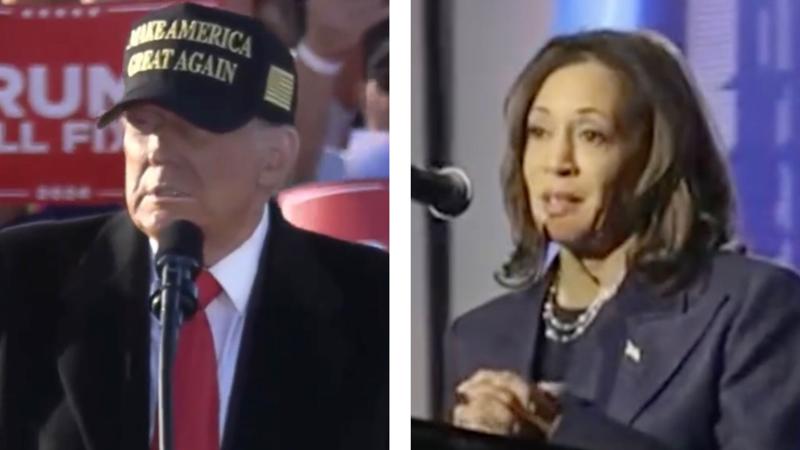Contrasting as much as party colors and platforms, Donald Trump and Kamala Harris spent Sunday barnstorming for votes and support among those still yet to cast a ballot for America’s president.
Across the country and particularly in battleground states, there’s been significant turnout for early in-person and absentee voting.
Trump, clad in his signature red hat titled Make America Great Again, opened with an outdoor rally in the borough of Lititz, Pa., population just more than 9,000 in Lancaster County. From there it was on to Kinston, an eastern North Carolina town of about 20,000, where the hat was black and the message atop it the same. His evening was to conclude in Macon, the heart of Georgia with population of more than 150,000.
All three states are battlegrounds, only Georgia being a state government trifecta – meaning same party, in this case Republican, with majorities in the Senate, House of Representatives and seated in the governor’s office.
Harris, out early in a Navy tweed pantsuit, attended church in Detroit; was about 25 miles northwest in the Oakland County seat of Pontiac afterward; and was to wrap up the evening in East Lansing, known mostly as the home of Michigan State University. Michigan, though one of 17 state government trifecta states, is also among the consensus seven battlegrounds.
The messages of each candidate remained consistent. Each continued to lay blame to the other for any woes voters may perceive, though Democrats’ message is arguably tougher because they’ve been in the White House all but four of the last 16 years.
The day’s early jolt of sorts came when mainstream media seized a Trump comment that prompted a response from the campaign team’s communications director.
During his speech in Lititz, the former president noted that the clear protective shield in front of the podium separated him from a would-be shooter – and the press gathered to cover the rally.
“I have this piece of glass here,” he said. “But all we have really over here is the fake news. And to get me, somebody would have to shoot through the fake news. And I don’t mind that so much.”
His campaign later said the characterization of his comment as “violent” is misleading.
“The president’s statement about protective glass placement has nothing to do with the media being harmed, or anything else,” said Steven Cheung. “It was about threats against him that were spurred on by dangerous rhetoric from Democrats. In fact, President Trump was stating that the media was in danger, in that they were protecting him and, therefore, were in great danger themselves, and should have had a glass protective shield, also. There can be no other interpretation of what was said. He was actually looking out for their welfare, far more than his own!”
Assassination attempts have twice targeted Trump, one drawing blood, the other snuffed out before a shot was fired at him. He held outdoor rallies Saturday and Sunday.
Harris, at Greater Immanuel Institutional Church of God in Christ, spoke of her early raising in an Oakland, Calif, church. She touched on Psalm 30:5, and perhaps former Republican President Ronald Reagan’s famous ad campaign, in saying, “We were born for such a time as this.
“The road ahead won’t be easy. But in times of uncertainty, we are reminded weeping may endure for the night but joy cometh in the morning. And, church, morning is on its way.”
Election Day is Tuesday. The vice president will watch returns at her alma mater, Howard University in Washington. The Trump campaign has a watch party at the convention center in West Palm Beach, Fla.
The schedule for the 60-year-old Harris was for only Michigan on Sunday and only Pennsylvania on Monday. The 78-year-old Trump, in addition to three states Sunday ending in Georgia, planned on Monday to leapfrog from North Carolina to Pennsylvania to Michigan.
Pennsylvania has 19 electoral college votes, North Carolina and Georgia 16 each, Michigan 15, Arizona 11, Wisconsin 10 and Nevada six.
Few prognosticators believe either candidate can win without Pennsylvania or North Carolina, and perhaps need to take both. The latter is the more likely of the two to declare a winner on Election Night, though the nation’s decision wasn’t known four years ago until Saturday.
In 2016, things turned for Trump against Hillary Clinton about 10 p.m. Eastern and less than five hours later he was declared the winner. Barack Obama was a winner before midnight in 2012 and 2008. John Kerry, 35 electoral college votes short, made the call to George W. Bush in 2004 on Wednesday morning.
The 2000 “hanging chads” race was called by the U.S. Supreme Court on Dec. 13, some 36 days later in an opposite end of the spectrum from four years earlier when Bill Clinton had the win by 9 p.m. Eastern on Election Day.
Trump has a 20-point platform, led by a return to enforcement of securing national borders. He chastises the Democrats for inflation that at 2.4% is nearly double – up from 1.4% – when he left office in January 2021, yet is considerably lower than the 9.1% high of June 2022 in the middle of Biden’s first term. Energy independence and “manufacturing superpower” are also in his top five.
Harris, not a candidate in primary season and until Biden quit 107 days before Election Day, says her top issues are an opportunity economy and lower costs for families. Tax cuts for the middle class, affordable rent and home ownership, and growth by small businesses also top her list. On abortion she favors federal regulation over state authority, meaning a return to Roe v. Wade.




